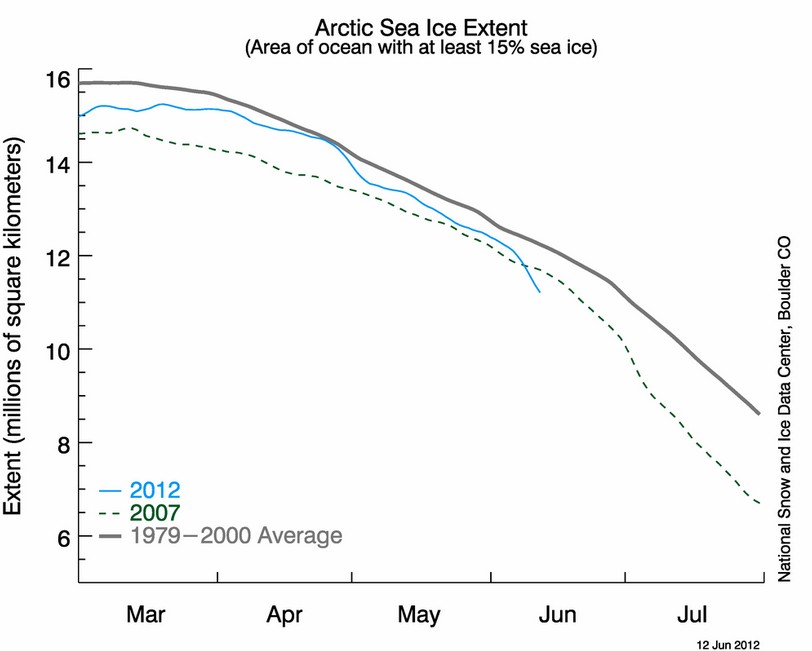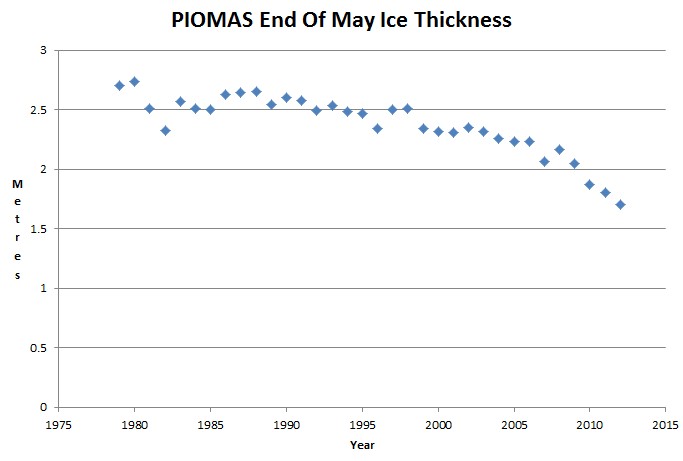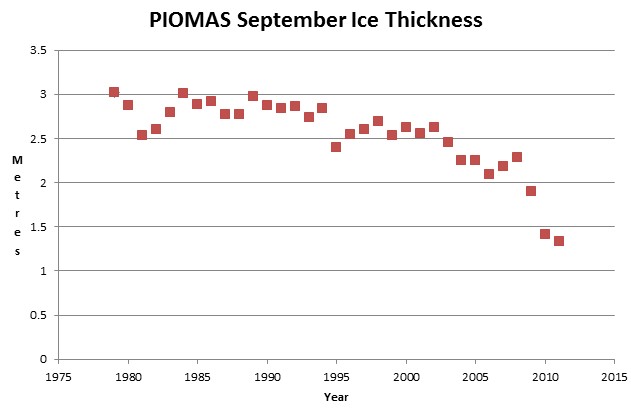Arctic sea ice extent is lowest on record for the date.
End of May ice thickness was lowest on record at 1.7 metres. Calculated by dividing PIOMAS volume by UIUC area.
Last September’s thickness was lowest on record at 1.3 metres. Headed for zero in 2015!
NASA’s Jay Zwally forecast a few years ago that the Arctic may be ice-free this summer.
NOAA says it is the hottest year ever.
Alarmists must be chomping at the bit to bet on a record minimum. It looks like a sure thing for PIOMAS believers. Who wants to bet?





This whole topic drives me crazy. If we were more advanced and capable of terraforming technology and colonizing an earth-like planet; we would most likely recognize the benefits of a warmer planet and with regards to the arctic a navigable commercial passageway.
I still have not received an answer as to what would be the ideal temperature of the earth!
There is no such thing as an “ideal” temperature (within reasonable limits). The only sensible objection I can see relates to rate of change. If the climate changes too fast, ecosystems and populations may not have time to adapt. The political dialogue is, “we must stop the climate from rising above 2C”. That’s not the right aim as temperatures typically change by 10-20C in a single day or by season. What the concern should be about is, “what is the rate of change?” Will it be too rapid for countries to adapt? Then the next question to ask is, is 50 years enough time to adapt to a 1-2C increase? Obviously, when you present the issue that way it becomes less alarming.
The other way to look at the question is to examine how economists see things. Climate analysis generally factors benefits to the planet up to 1.5C of temperature increase, and then negative consequences after that. So if you asked certain economists what the ideal planetary temperature should be, then they would answer: the current global average temperature plus approx. 1.5C.
A lot of ice was put on late last year and therefore never got very thick, this is now disappearing fast, as you would expect, but I think the rate will slow soon.
However I still think it will be a very low maximum this year. Canadian side is already looking quite broken up and I expect the Russian side to once again be the main area to lose ice.
I doubt we will be ice free at the north pole anytime soon unless we have another 2007 and even then it will be broken ice not clear water.
Andy
So are you betting on a record low?
The highest SST anomaly can be found along Greenland western coast, and in Russian sea areas (SE Barents Sea, the White Sea and Kara Sea) http://ocean.dmi.dk/satellite/index.uk.php
(06/13/2012), while the Northern North Atlantic (from Iceland to Svalbard(Noth Cape) is slightly colder than the mean, which makes a bet difficult, because the ocean temperatures matter more than anything else (http://www.arctic-warming.com/).
What is interesting to note, that higher SST can be observed in regions with higher human activities, e.g. shipping, fishing, off-shore etc.
The danger of betting is that they may just make up a number.
Judith Curry discusses: Causes(?) of ocean warming, Posted on June 11, 2012 | 188 Comments
MY Comment there:
ArndB | June 14, 2012 at 4:28 am | Reply RE: JC summary : “Focusing on the period since 1983 makes sense because this is the period where we have the best satellite data sets, but there are still substantial problems with the ocean temperature data sets. Many people I talk to have little confidence in the ocean temperature analyses prior to 1980, and most people agree that there are very substantial problems prior to 1960. “
The time period 1940 to 1970 is marked by a global cooling, which started with three extreme cold winters in Europe together with the 2nd World War. It should not be so difficult to find out, whether the huge penetration of the North- and Baltic Sea, and the North Atlantic (and Pacific since December 1941) by naval war activities did contributed. This is at least my conclusion that I presented first in a book 2005 here: http://climate-ocean.com/ , and this year (2012) here: http://www.seaclimate.com/ .
“The only sensible objection I can see relates to rate of change. If the climate changes too fast, ecosystems and populations may not have time to adapt. The political dialogue is, “we must stop the climate from rising above 2C”.”
The incessant political dialogue speaks as if we here on earth could effect the GMT of the earth with a concerted effort +/- 2C. This is non-sense.
With regards to the rapidly changing climate; if your hind quarters are to fat to get you out of the way of the expanding glacier, you do not need to be included in the gene pool. Migration towards the poles has not been observed. Masses of people tend to move towards warmer climates and are only observed moving towards colder climates to exploit generous welfare systems.
“Migration towards the poles has not been observed.”
http://www.bitsofscience.org/climate-migration-species-poles-science-2733/
?
http://stevengoddard.wordpress.com/2012/06/14/yet-another-study-wasting-taxpayers-dollars-on-global-warming-propaganda/
I just moved south 60 miles last week. Apparently, the theory is bunk.
Thank God for that!! Getting rid of the midges that plague Scotland. So after my 3 decades respite I should make it to the Cairngorms midge free. Oh wait! It’s not happening. Someone is lying to me!
Longitudinally three quarters of the planet is now under the influence of a Two Solar/Earth Year ‘Wet’/Normal Period. In six months all of the planet will be under the influence of this ‘Wet’/Normal Period. Thus, an approaching period of increased snowfall and precipitation, and therefore more ice, (land and sea.)
Doesn’t wind have a lot to do with ice extent? I read somewhere this morning about wind opening up passages in the arctic.
That’s what caused the 2007 Arctic anomaly.
It’s time they ditch the 1979-2000 average. It is beyond meaningless, it now borders on fraudulent.
Months ago I was told that average was under review. How slow are these people? Or how dishonest?
Let it all melt – will reduce shipping charges and improve the economy.
And they still can’t get that one right. Even the Doofus’s the Alarmists at PIK.(Potsdam institute of Climate) The head of PIK was saying one thing and the senior PIK Climate Scientist was saying the other.
If all the sea-ice melts. It’s supposed make the NH colder or it’s supposed to make the NH warmer. Yes that’s right. It does both. 🙂
I’m one of those who placed my bets a couple of years ago. I’ve started planting aplle varieties that ripen no later than October , in fact I’m shooting for mid September for most varieties if not earlier. Our late apples just have not had the quality we desire due to colder fall weather. Some will probably tell me it is due to CO2 and global warming but I will follow the two Joes and bet on a time of cooling.
Hi Steve,
I had an earlier attempt to explain the concept of a spread bet to you, but here goes again.
If minimum ice area, as measured by Cryosphere Today, is NOT in the ten lowest areas, I will pay you US$5,000. That is, if it is in places 10 thru to 34. You have 24 chances to win $5,000.
If it is ninth lowest, I will pay you $4,000.
8th – $3,000.
7th – $2,000.
6th – $1,000.
If, on the other hand, ice area shows absolutely no sign of rebounding since 2007, then 2012 would be one of the top five lowest areas on record.
In which case you pay me:
If the minimum ice area, as measured by Cryosphere Today, is the fifth lowest, just $1,000.
4th – $2,000.
3rd – $3,000
2nd – $4,000
1st – $5,000
Wanna bet, pussycat?
Read the title of the post.
All of the global warming religious icons point towards a record minimum. The bet is straight up or down, on a record minimum.
Jak: Do you really think someone will take you seriously if you won’t even reveal your real name?
PIOMAS has been clear that their model is not accurate for very low values of volume….
Why are you telling me about it? It is the alarmists who take PIOMAS seriously, you should be talking to.
Because you insist on applying the model to an area for which it is not applicable.
So now accurately reporting what someone says is “applying the model to an area for which it is not applicable.” That sounds like some post-modern bullshit to me.
In 2007 Jay Zwally was reported to say, ” “At this rate, the Arctic Ocean could be nearly ice-free at the end of summer by 2012, much faster than previous predictions.”
http://news.nationalgeographic.com/news/2007/12/071212-AP-arctic-melt.html
Notice his preface, “at this rate….” Has that rate, in fact, continued?
Has the press followed up with a retraction to their scare story about the 2012 ice-free Arctic? Of course not. It is hit and run journalism.
Someone from the press hasn’t Obviously, and that’s a strech of the use of that word “press” here.